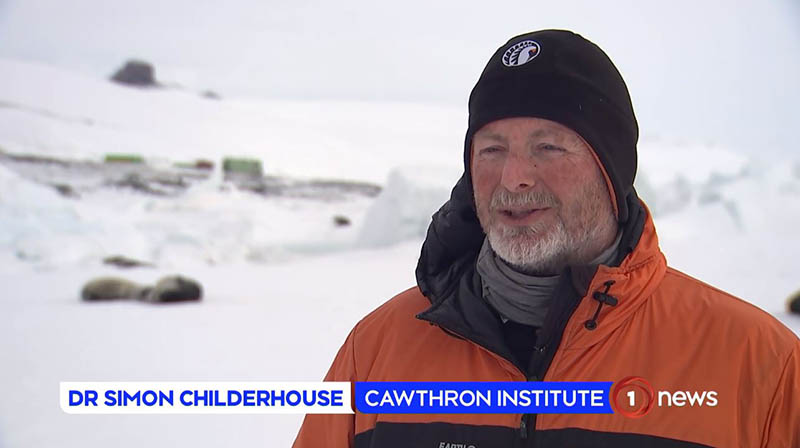IRANZ news briefs
Dr Simon Childerhouse from the Cawthron Institute discusses his research on the private lives of Weddell Seals in Antarctica on 1 News. Image: TVNZ.
New Zealander of the Year semi-finalist and CAR T-cell therapy
Malaghan Institute of Medical Research supporter David Downs, cancer survivor and self-declared genetically modified organism, is one of ten semi-finalists for Kiwibank New Zealander of the Year 2020 for his efforts in bringing revolutionary CAR T-cell therapy to New Zealand. David, who was diagnosed with non-Hodgkin lymphoma in 2017, ultimately travelled to Boston, USA to receive life-saving CAR T-cell therapy. Upon returning to New Zealand (cancer free), David discovered that the Malaghan Institute was preparing to conduct its own CAR T-cell clinical trial, the first of its kind in New Zealand. Learn more about David’s efforts on behalf of the Malaghan Institute that to date have raised hundreds of thousands of dollars.
In other CAR T-cell news, its latest round of funding, Te Pūtea Rangahau a Marsden, the Marsden Fund, has allocated $958,000 over three years to investigate the tumour-homing properties of CAR T-cells to facilitate targeted chemotherapy of solid tumours. The research will be led by Professor Ian Hermans, the Institute’s Deputy Director and Cancer Immunotherapy Programme Leader. See Marsden funding for CAR T-cell research into solid tumours.
Dr Robert Weinkove, Clinical Director at the Malaghan Institute and a Consultant Haematologist, will be briefing MPs on the CAR T-cell programme at the Royal Society Speaker’s Science Forum “The Fight Against Cancer” on 24 June in Parliament’s Grand Hall.
Cawthron scientists on TV
Cawthron scientists have been featuring on TV in the last couple of months. On 18 January, Marine Mammal expert Simon Childerhouse was on 1 NEWS. Simon has spent the summer months researching the private lives of Weddell Seals in Antarctica.
On Ocean Bounty on TV3, Graeme Sinclair follows the lifecycle of one of New Zealand’s most delicious delicacies, Te Matuku Oysters, from the Cawthron Aquaculture Park to the table. The Cawthron Institute support the oyster industry with a selective breeding programme which enables more resilient, beautiful oysters. A must see for the oyster lovers out there.
Red seaweed research attracts global attention
The Cawthron Institute continues its research into native red seaweed – a potential game changer for the agricultural sector, as, added to feedstock, it could reduce greenhouse gas emissions in livestock by up to 80 percent. The research is now attracting attention from around the globe.
Nick King, Senior Scientist – Shellfish Aquaculture at Cawthron, will be briefing MPs on this exciting programme at the Royal Society Speaker’s Science Forum on “Greenhouse Gases and Emissions Reduction Technology” on 27 May in Parliament’s Grand Hall.
Handheld moisture meter winning awards
Lincoln Agritech was commissioned by Bluelab to help design and prototype a handheld meter to measure moisture in potted plants, which was commercialised at the end of 2018. Bluelab is a Tauranga-based manufacturing company that develops and manufactures equipment for the global hydroponics industry. The resulting Pulse MeterTM has gone on to win several industry awards in the past year including ‘Excellence in Innovation’ at the Bay of Plenty Export Awards and ‘Excellence in Innovation’ at the 2019 New Zealand International Business Awards.
Intern at Lincoln Agritech presents Master’s thesis
Judith van Rijthoven has spent her last six months as an international intern at Lincoln Agritech, working with their Precision Ag team. On 16 January, she presented her project to staff, "A simulation study design: nitrogen runoff". This was part of her master’s degree in Biosystems Engineering at Wageningen University.
Malaghan launches Women in STEM video
The Malaghan Institute of Medical Research has recently launched a new video for February's International Day of Women and Girls in Science 2020. At the Malaghan Institute more than 60% of their scientists are women. Women who are doing cutting-edge immunological research, making groundbreaking discoveries and working hard to find cures for diseases like cancer, asthma, allergy and MS.
From students to research officers, team leaders to department heads, these women are nothing short of amazing. This video asks some of them why they chose to become a scientist, and what makes them passionate about research?
See the IRANZ video and tv page for more.
2020 Rotary Forum at HERA
Staff at HERA kicked off their year by hosting the 2020 Rotary National Science and Technology Forum at HERA House in Auckland. The event saw 27 high-achieving now Year 13 STEM students from around the country on a two week trip to gain insight into future career pathways. HERA took the opportunity to inspire future engineers to work in the metals industry and showcase the real opportunities that exist within the sector.
HERA's Stirring the Pot podcasts continue
HERA has relaunched their podcasts for 2020 and will be talking on a wide range of topics from diversity to innovation, design guide lines, structural projects, people profiles, sustainability, climate change, and more.
They already have two new offering up: An indigenous approach to STEM engagement; and School of future environments. Check them out.
Verum Group scientists to play key roles in international mine water congress
Verum Group scientists will be playing key roles in the 14th International Mine Water Association Congress, which will be hosted in New Zealand in November 2020. Verum CEO Dr James Pope is Convener of IMWA 2020, with Dave Trumm and Hana Christenson, scientists that have produced world-leading innovations in mine drainage chemistry studies and development of remediation techniques, presenting at the conference.
PlantTech sponsoring STEMfest
PlantTech is a foundation sponsor for STEMfest, a world-class festival held in Tauranga in conjunction with the Groundswell Festival of Innovation. The inaugural festival in October 2019 was deemed an “outrageous success”, with some 5000 tickets selling out three-weeks before the main event. The event itself looks set to win awards with the announcement on 6 February that it has been short-listed as a finalist in the TECT Community Awards.
PlantTech CEO Mark Begbie says the annual event is designed to engage and inspire a new generation of scientists, technologists, engineers, and mathematicians.
New members on Bragato Research Advisory Committee
The Bragato Research Advisory Committee provides advice and recommendations to the Bragato Research Institute Board on the merit and relative priority of proposed new research. This is a critical role to ensure that research aligns with industry needs and industry priorities and will lead to industry benefit. The committee also considers the quality of science proposed, approach, and how the proposed work fits with other previous or current work and what is already known in the international literature.
Two new appointments have been made to the Research Advisory Committee - Wendy Stuckey and Jeff Sinnott.
Wendy has worked at Constellation Brands New Zealand, Chateau Ste. Michelle in Washington State, and for18 years in the Barossa Valley region of Australia, including several years at Wolf Blass where she was responsible for some of the company’s iconic white wines.
Whilst working in the US Wendy was named as one of the Top Most Admired Winemakers in the North American wine industry and included in intowine.com’s Top 100 Most Influential US Winemakers.
Jeff has worked in training and research with EIT Tairawhiti, in commercial viticulture, and winemaking in Gisborne, Marlborough, Central Otago, and Waipara and is a founding partner in his family’s vineyards in the Waitaki Valley. He is a founding member of the Tuku Māori Winemakers Collective and is the current president of the New Zealand Society for Viticulture and Oenology.
For more information see Wendy Stuckey and Jeff Sinnott appointed to the Research Advisory Committee.
Date posted: 24 February 2020

